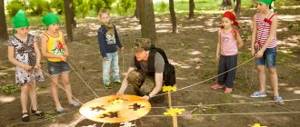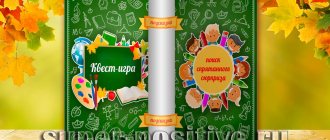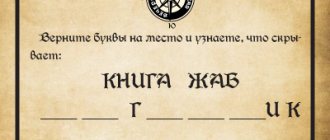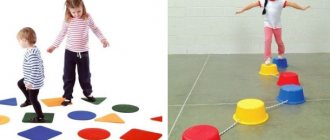Quest game “Bibliodriving” educational and methodological material on reading (grades 1, 2, 3, 4) on the topic
When you remember your childhood, a picture immediately appears: evening, mom is reading a book, and you are lying in bed and about to fall asleep. And in a dream, the fairy tale continues - you turn into the main character and perform your own little feat. These books remain in my memory forever. We had no idea what a computer was, we didn’t have the Internet, mobile phones, and we rarely watched TV, because we ran outside to play “Cossack Robbers,” hopscotch, rubber bands, and just chat with friends. For modern children, virtual life is much more important; it is more interesting to sit down at the computer and immerse yourself in social networks. But what about books? Will our children really never be able to get real pleasure from the rustling of turning pages? We decided that all is not lost, there is a way to at least try to give such an opportunity to children - and this is the quest game “Library Driving”!
But still, the 21st century is the century of advanced technologies; it is impossible to imagine a person’s life without communication via a mobile phone. Most often, children use gadgets for unproductive pastime. And we decided to combine simple books, modern programs installed on the phone, which will help you get real drive from playing with books!
Goal: to activate the cognitive activity of students and show the importance of reading through various forms of working with books and modern technologies.
Tasks:
- create favorable conditions for developing the ability to plan ways to achieve set goals, find effective ways to achieve results, the ability to look for alternative non-standard ways to solve cognitive problems and control one’s activities carried out to achieve goals;
- develop the ability to listen to other opinions, as well as formulate, defend and argue your point of view, find a common solution that will satisfy common interests;
- promote the development of the ability to independently find criteria and grounds for classification, establish cause-and-effect relationships; build logical reasoning, draw conclusions and draw your own conclusions; use symbols and signs when deciphering information;
- use various sources of obtaining information using books and QR codes, QR Scanner programs;
- promote the development of creative abilities and cognitive activity;
- implement the principle of task variability for each age group of children;
- involve teachers, parents, and a librarian in the game as part of a social partnership.
Scenario plan for the quest game “Bibliodriving”
Message from 19th century writers discovered in school library archives
V.G. Belinsky and N.V. Gogol. But, unfortunately, the ending of the statement “And do not forget that a good library is the greatest thing...” is damaged. To restore the original text, you need to find the letters and compose the desired word (“TREASURE”) from them.
The educational space for the game consists of:
- the platform where all participants gather at the beginning of the quest,
- libraries (you can use any room where there are about 20 books on the tables),
- mirrors (which can be found in any institution)
- several rooms where stations can be placed:
- "Archive of Secret Materials"
- "Digital Poetry Rack"
- "Shelf of Book Lovers"
- "Aesthetic catalogue"
- "Book Depository"
- "Through the Looking Glass"
- "Museum of Fairytale Images"
- "Sharobum Foundation"
- "Manuscript of the Great Secret"
Quest tasks
Every day the popularity of quests is growing - more and more people are learning about them.
And many people have a desire to come up with their own quest for some holiday for their family and friends. Coming up with tasks for a quest is not an easy task; here you will have to call on all your imagination, ingenuity and resourcefulness to help. It is worth noting that puzzle-solving games are loved not only by children, but also by adults. Over many centuries, humanity has come up with a huge number of riddles, charades, logic problems and other tasks that can not only diversify leisure time, but also help develop mental skills and thinking.
In this article we want to tell you how you can apply many well-known and favorite tasks from childhood to your quest. Pay attention to the main condition - the answer to the task must be a word denoting a place or object, and which can serve as a kind of hiding place. After all, a quest is a chain of tasks, each of which is hidden in a certain place. Having completed the next task, players learn the key word, and it tells them where to move next. At first glance, it may seem that the answer in the form of some word is obtained only when solving puzzles, crosswords and riddles. In fact, you can even get a word in a puzzle like origami. And we will tell you how to do this in this article.
How to choose keywords for a quest
The core of the quest is the puzzle cards and the locations that the answers to those puzzles point to. After all, as we wrote above, all tasks are hidden in various places and objects.
Places and words denoting them can be common, found everywhere: bed, TV, door, window, etc. Or they can be specific, found only in a specific room or in a specific area. For example, you can use the names of indoor plants, books, tourist souvenirs, etc.
Or it happens that one word has a double meaning for some people. An example could be this: there is a cat in the family, the household jokingly calls him Loaf, or, well, Sofa) So this word can be made the key word in the quest. Having received the word “sofa” in the answer, players will not immediately realize that they need to run not to a real sofa, but to the cat or to the place where he sleeps or eats. Such funny moments will make the game more fun and interesting. They will add individuality to the quest and tasks, show that the organizer put his soul into the process and took into account the interests and passions of loved ones.
A similar example can be given with the use of souvenirs from trips around the world. For example, you have a plate hanging on your wall - a souvenir from Paris. This is an excellent reason to add a task to the quest, the answer to which will be something related to Paris or France. Maybe even the word “Paris” itself.
There are many similar examples. But we will not delve into them, since the purpose of this article is to give advice on how to come up with tasks for a quest yourself, for example, for a birthday. We will also use specific examples to analyze how to adapt and implement various types of puzzles into the quest. We will, of course, share some secrets, but we won’t reveal them all just yet. The examples of tasks presented below are taken from our quests, which you can view in the catalog.
Now let's look at how different types of tasks can be “modified” so that the answer to them is a word - the name of an object or place. Only then can you include this task in the quest.
Individual tasks
Above we described only a small part of the tasks that can be used in the quest. In our scenarios you will find many other original and unique tasks.
We try, whenever possible, to include so-called individual tasks in our quests. They help to personalize the quest and give it the appearance of an individual, designed specifically for a specific person or company.
For example, the task “Our Date” in the Romantic quest (link to the rum quest) is based on the date the couple met. Without remembering it, it is impossible to solve the task. A similar type of task “Do you know me well” with personal questions is also irreplaceable if the quest is being prepared for a loved one.
Quest tasks
There are different types of puzzles for such attractions, but here are the main ones: - with the participation of actors. The presenter and the characters of the game are not just dressed in costumes that reflect the theme of the game - they know important information that the players will have to obtain with the help of correct answers to questions. - team In this case, everything is arranged in such a way that each team member must become a participant in the process - simply standing on the sidelines will not work. For example, several people may be required to support the props, find the key, or quickly collect information over a large area. – logical If we consider any quest, the task scenarios can be very different, but almost no game can do without this type of puzzle. Logical tasks are solving puzzles, calculating ciphers and rebuses, comparing facts.
Our quests
Developing tasks for an quest is not only about coming up with original puzzles for the quest. Be sure to take the time to include some moving tasks into the quest. They will help diversify the quest and keep players from getting bored.
When purchasing most of our scenarios, we give our customers a specially designed set of active tasks for the quest.
The set includes tasks according to which players must perform certain active (physical or creative) actions. If completed correctly, they move on to the next stage and receive another puzzle or task.
Please note that quests usually do not imply the participation of the presenter in the game process, because players find tasks themselves, solve them themselves, and receive hints on where to look for the next ones. If you enter active tasks, the participation of the presenter will become mandatory.
Tasks
Team name.
In order to start our game, we need to give a name to our teams, but we will not come up with a name, but guess it. We've got three teams, now it's a mystery.
Get up early in the morning, jump, run, do push-ups. For health, for order, People all need... (exercise)
I have no time to be sick, friends, I play football and hockey. And I am very proud of myself, What gives me health... (Sports)
What is more valuable than gold? (health)
Well done! Here are the guide sheets for you at each station, a liaison officer with tasks will be waiting for you, after completing his tasks you will go to the next station.
Quests for teenagers
Simple puzzles are no longer enough for an event with teenagers. It will be more interesting for teenagers to solve more complex, logical tasks, but the quest should still be bright, dynamic, with interesting transitions, so that teenagers do not get bored in some moments of failure. Ideally, this should be an interactive, dynamic game that contains elements of logic, risk, and interesting quest tasks.
Thus, quests are one of the most original ways to spend a birthday, a children's party, or an ordinary boring day. There are a lot of options: choose any. And believe me, such an event will be remembered for many years!
Examples of quest tasks
It is, of course, impossible to list all the tasks, since there are hundreds of them. But here are a few of those that you may encounter in one or another version of the game: - defuse a bomb, a dummy of which is built into a suitcase. You open the case, the timer starts counting down, say, a minute and a half. If unsuccessful, there will certainly not be an explosion, but you will hear a sound signal. – you need to take fingerprints from a cup or lighter and compare them with those provided by the detective; – you need to match the words from the newspaper headlines with the map and get the key; – one of the players puts on a helmet with a camera, but he himself does not see anything. His movements are controlled by the rest of the team using a tablet and prompts; – recognize writing on the wall using an ultraviolet lamp; – get to the desired key/folder with documents through a laser alarm; – having picked up the keys, dial a certain combination of numbers on the phone and listen to an important message; – collect information over a large area, communicating with the team using walkie-talkies (tasks can be located on trees, houses, objects, etc.); – develop the inscriptions on an ancient scroll using special solutions; – cope with a large manual maze in which the ball must fall into certain pockets; – create a keyword using a code set of numbers and a book; – solve the puzzle by mixing various substances, etc.
It’s unlikely that anyone will send you a finished quest with tasks, since scenarios are a trade secret, and they are often compiled individually, taking into account the wishes of customers and budget limits. However, if you need to organize a quest, you can take as a basis the sample scenarios proposed on the relevant sites and supplement them with your own tasks, based on who the event is being prepared for and under what conditions it will be held.
Quest tasks for children
The complexity of the tasks affects how exciting the event will be, but in this case you need to adhere to the rule - “don’t overdo it.” The tasks should not be overly complex, but even simple tasks are boring. https://42project.ru/services/kvesty-dlya-detey/ind_quest/ will help you organize a bright and unusual quest for a children’s party. What kind of tasks could these be? Well, one of the simplest quest options for children is “Cobweb”. You need to take a long rope, a lock and a key. The rope is wrapped in any order around the trees, a lock is attached to one end, and a key is attached to the other in such a way that they can be easily moved along the rope. The kids' goal is to open the lock. One group “drives” the lock, and the other the key. In the middle of the journey, the groups meet and successfully open the castle.









